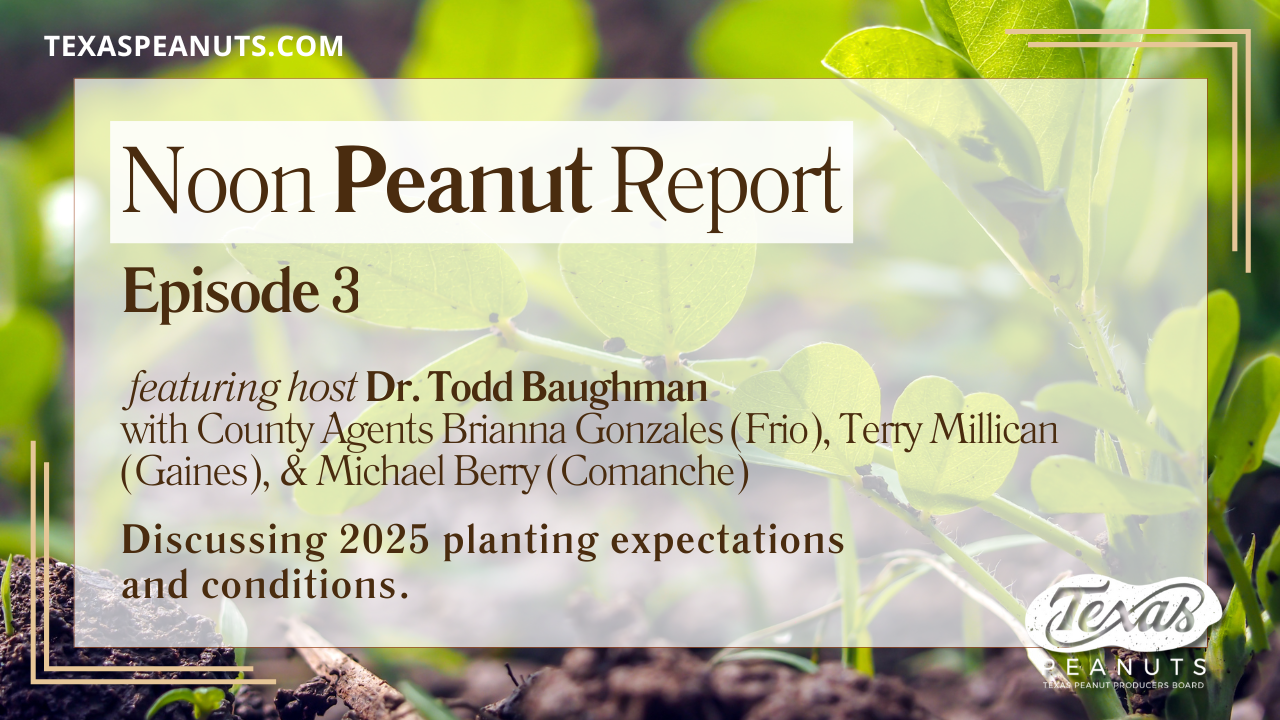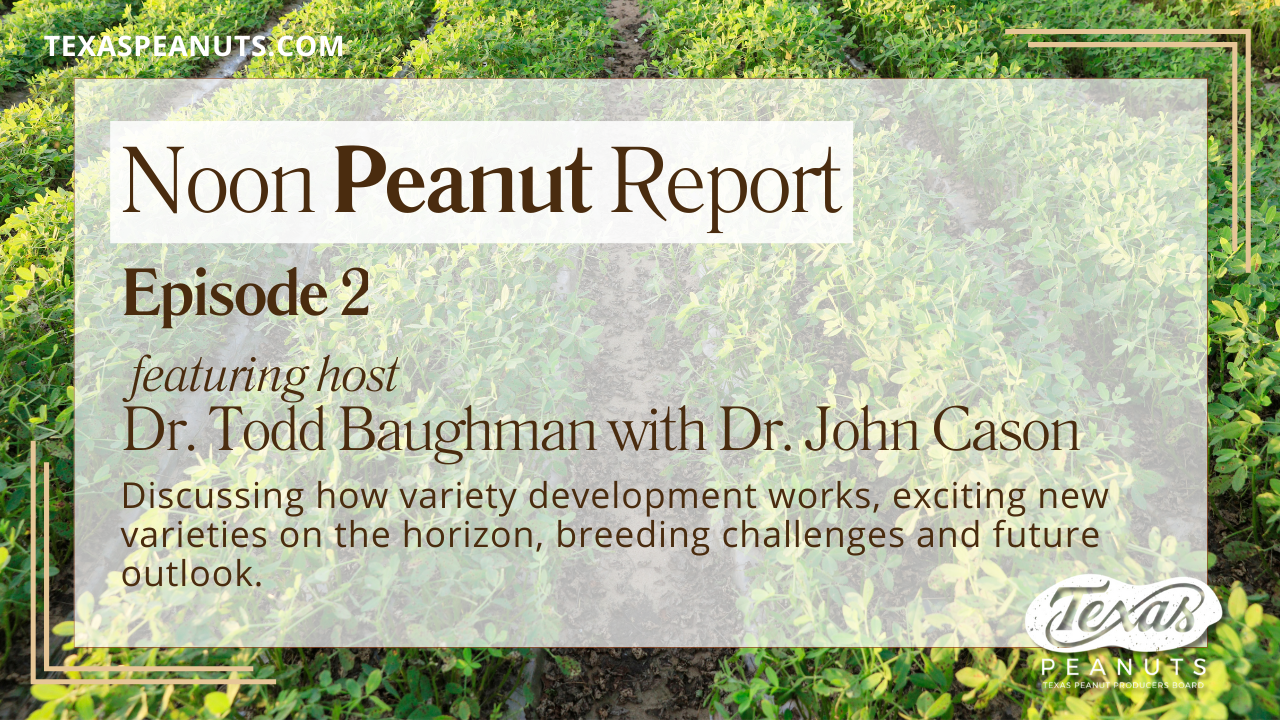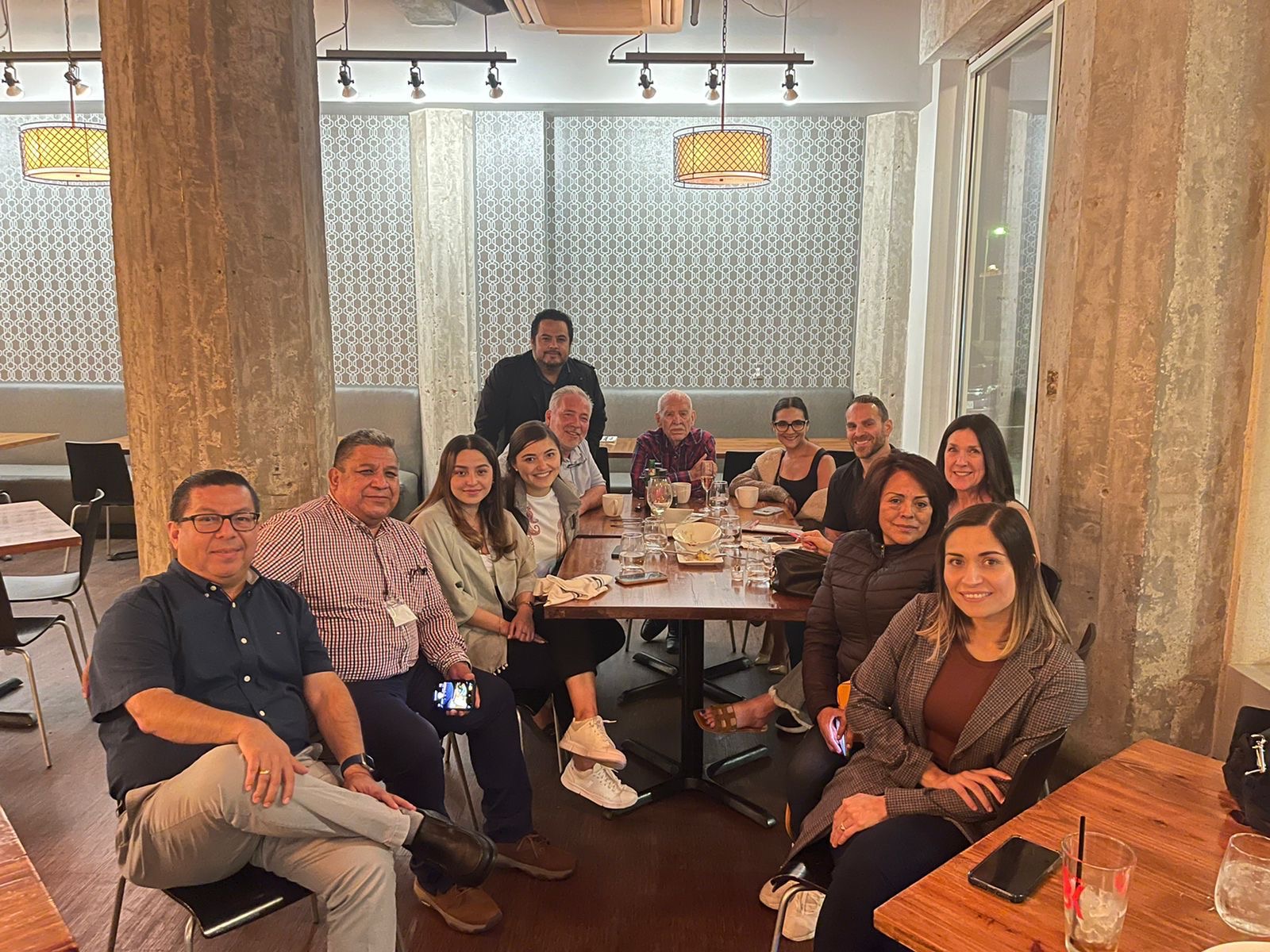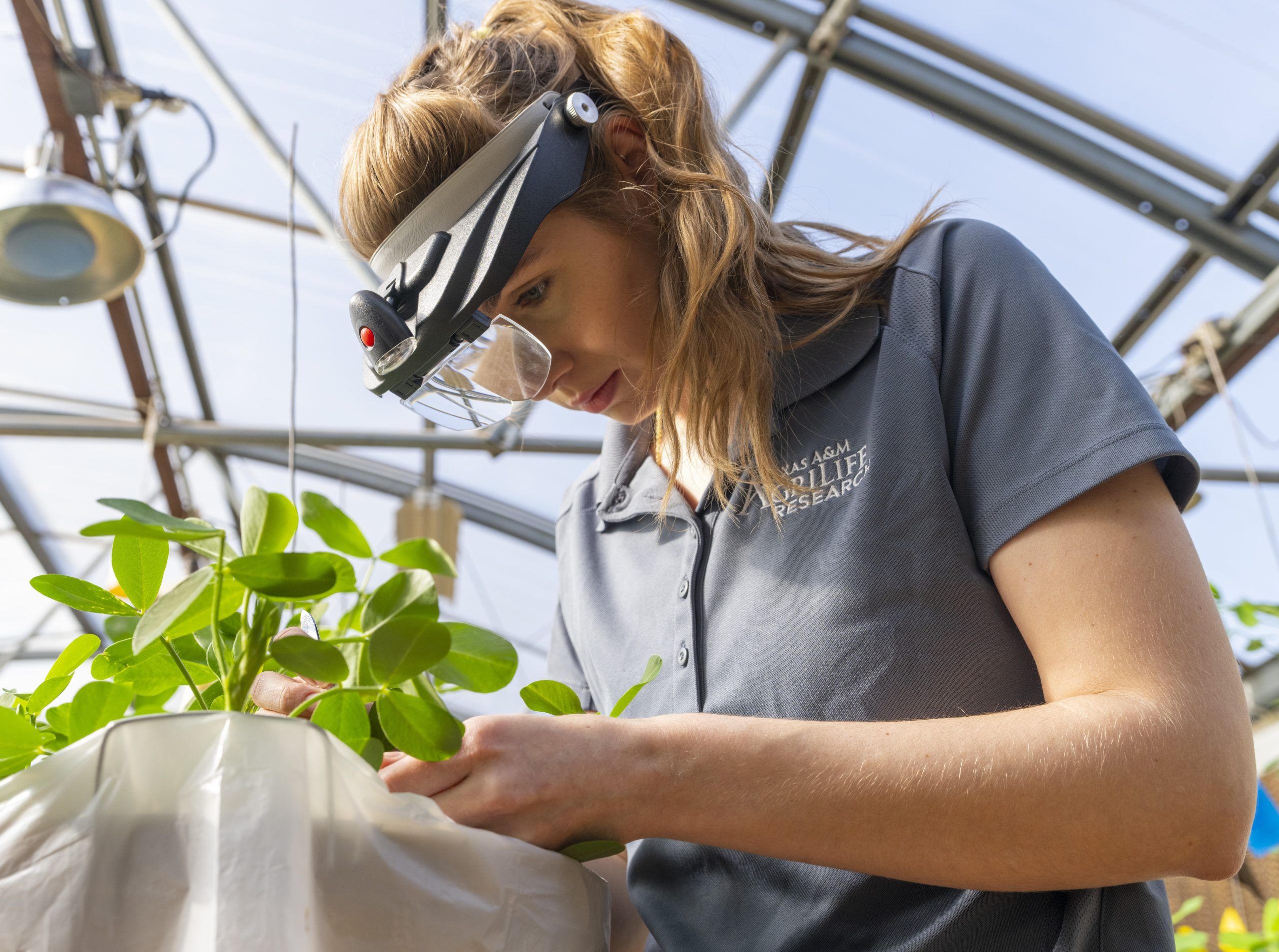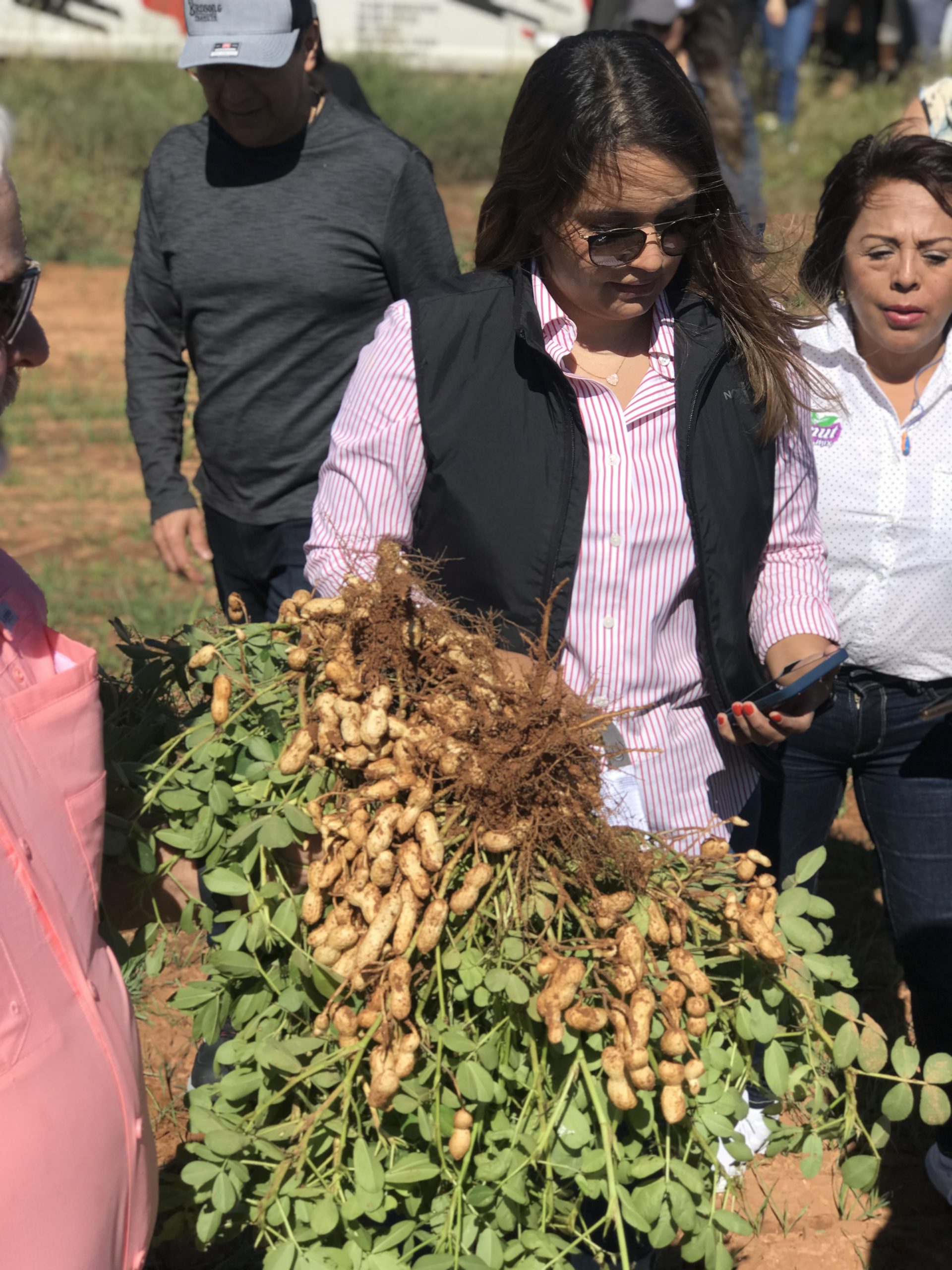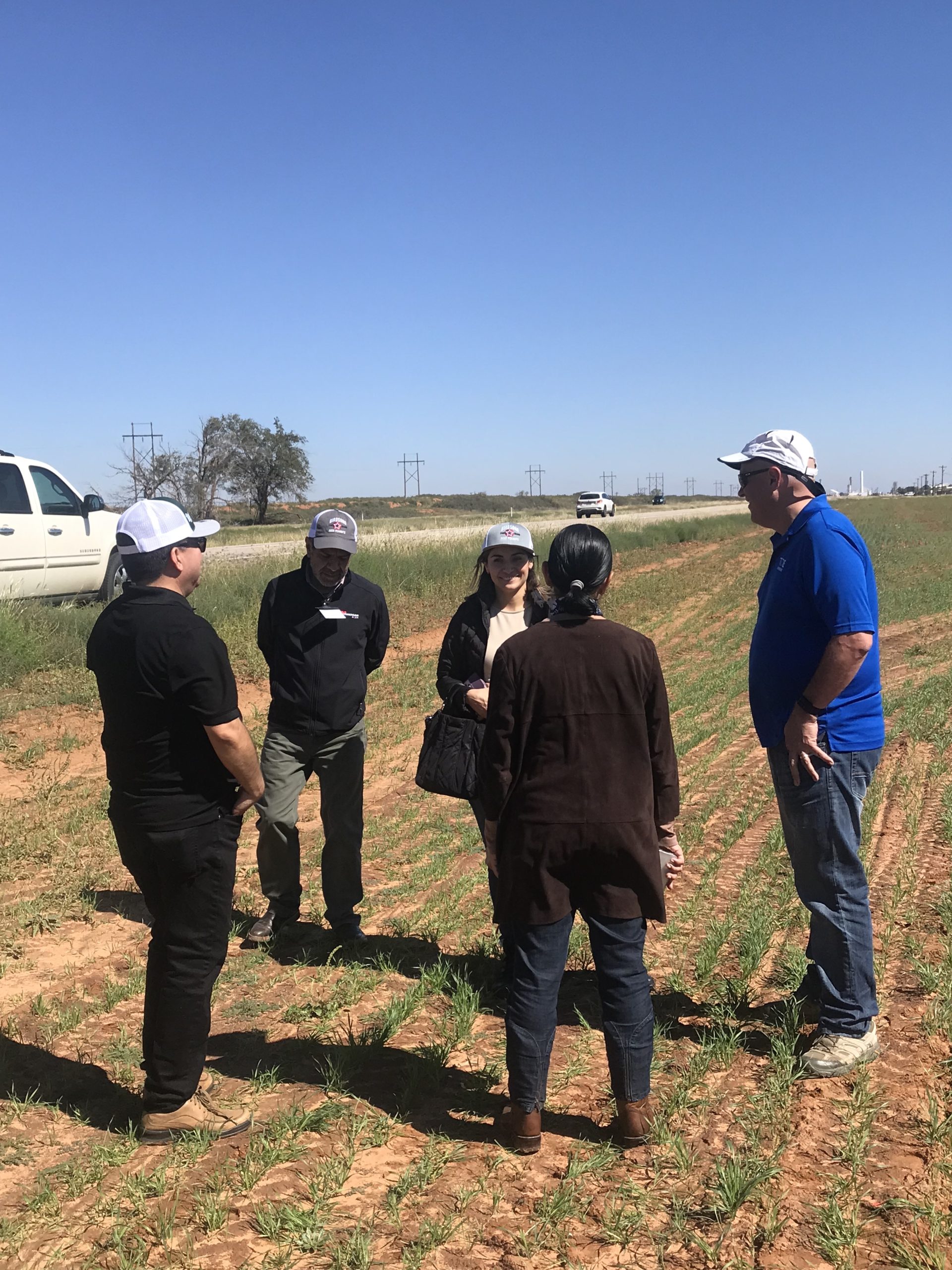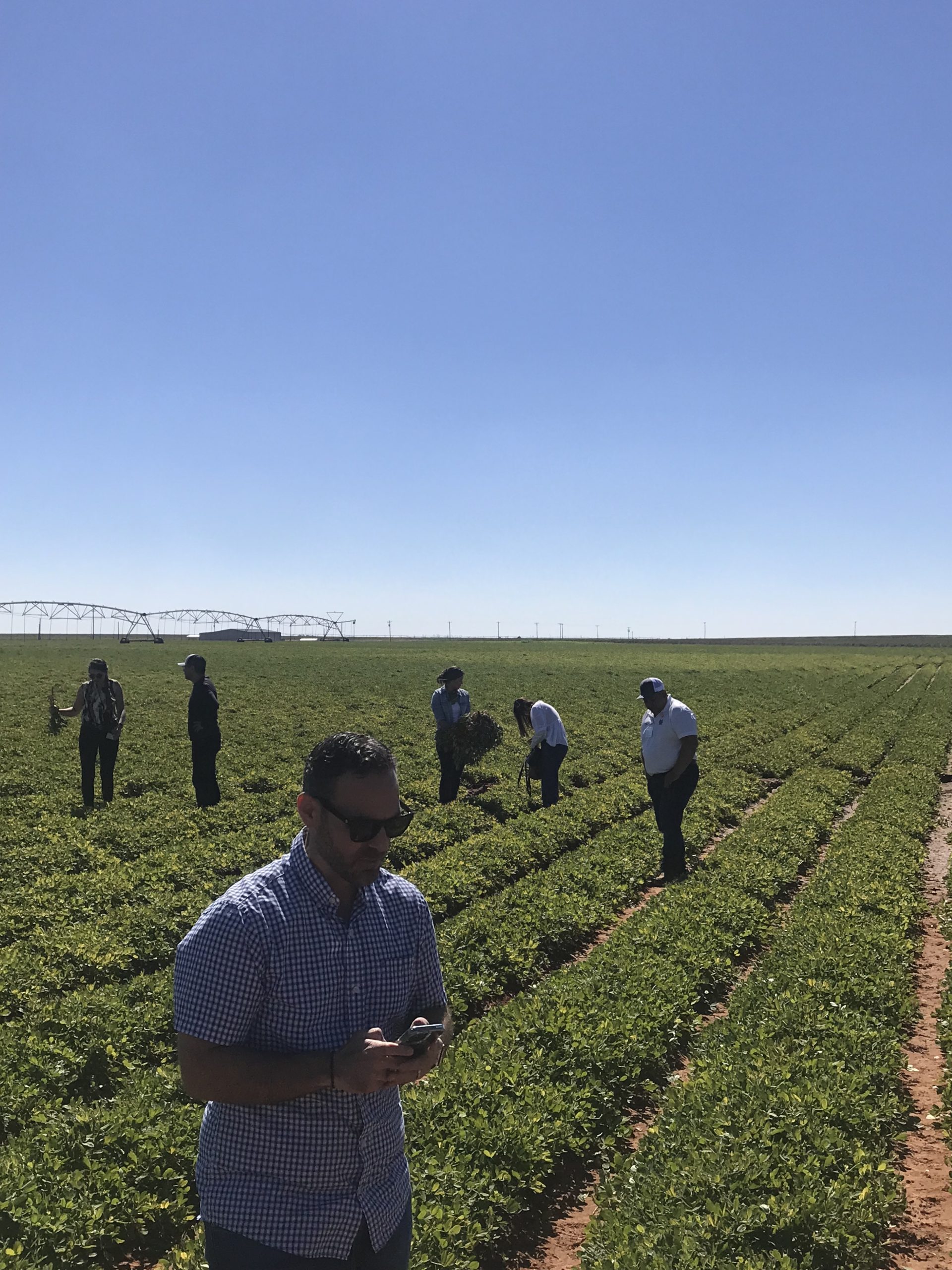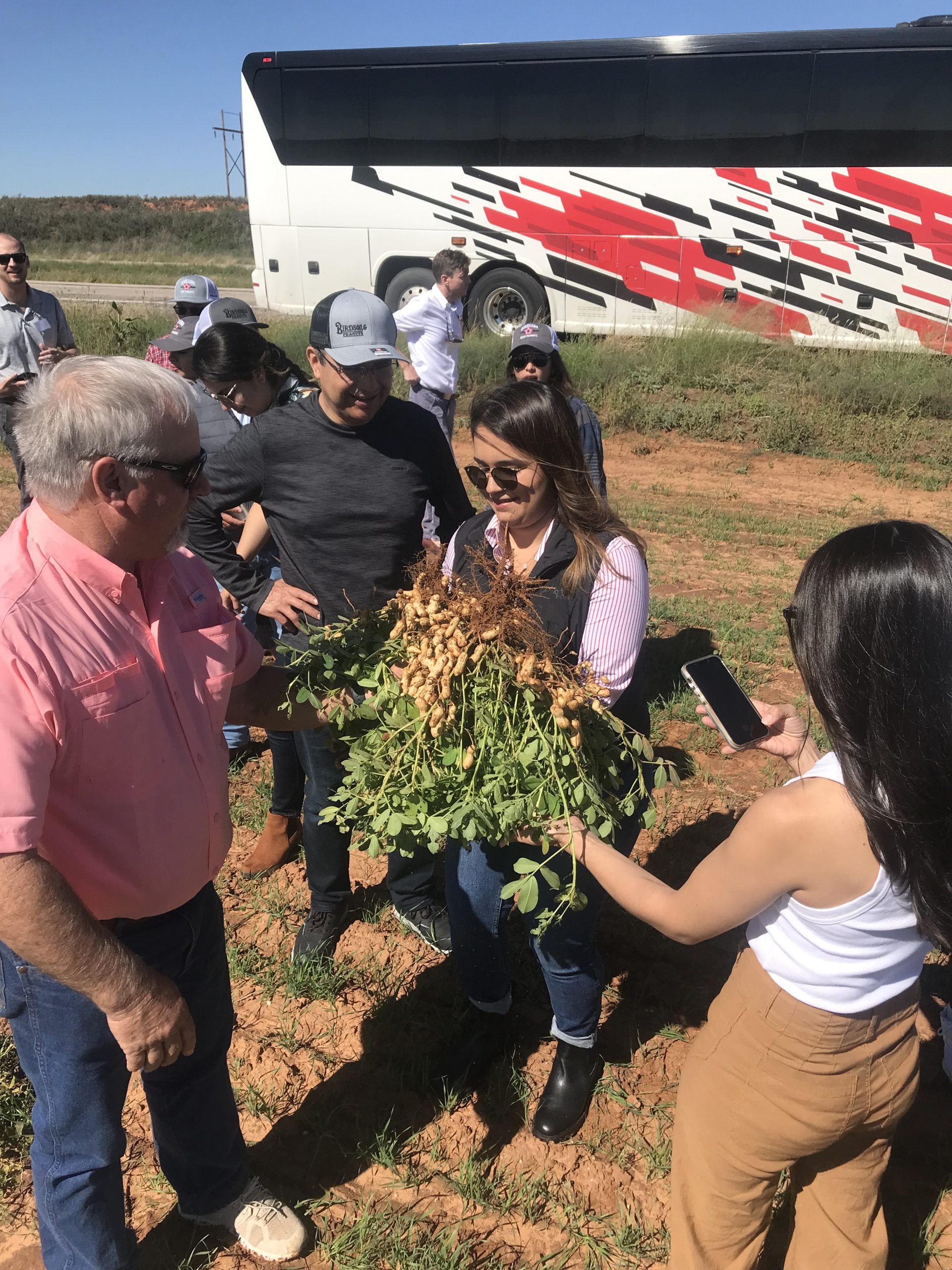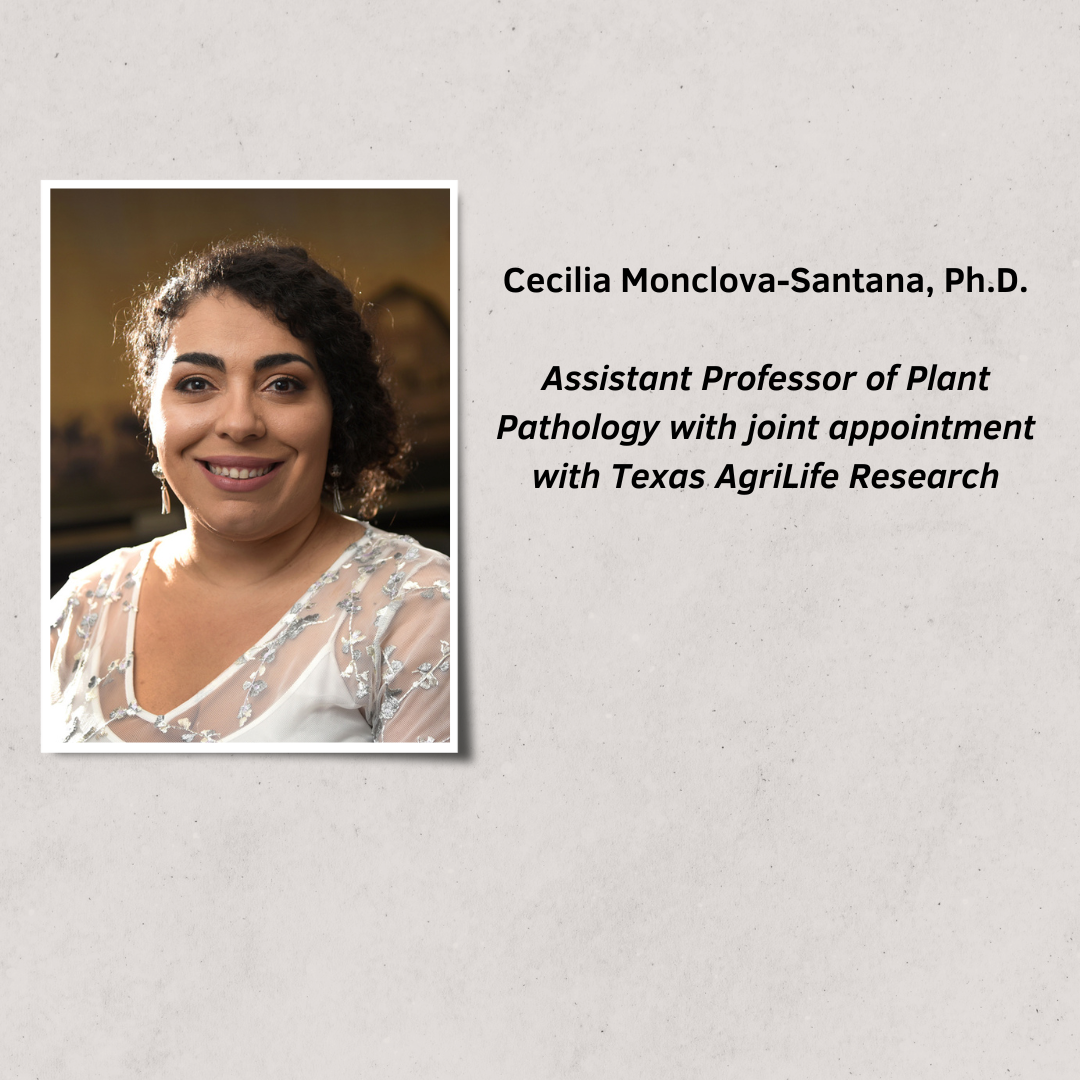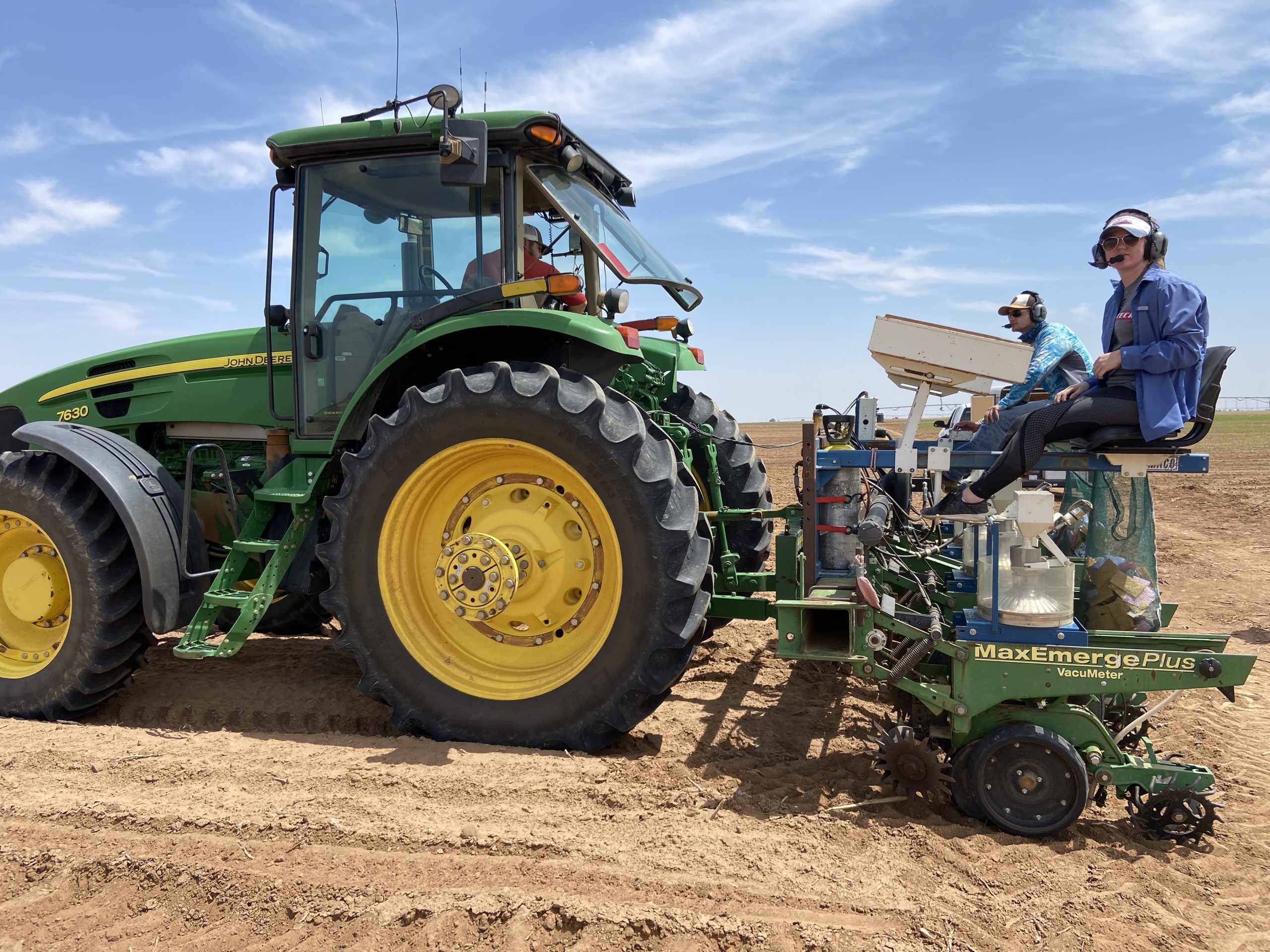Jump back into the Noon Peanut Report with our third installment, filmed live May 16, 2025. Dr. Todd Baughman is joined by several AgriLife County Agents from around the state to discuss planting expectations and conditions. Special guests include Brianna Gonzales (Frio County), Terry Millican (Gaines County), and Michael Berry (Comanche County).
Category: Latest News / Blog
Noon Peanut Report with Dr. Todd Baughman & Dr. John Cason | April 18, 2025
Catch up with the Texas Peanut Producers Board’s Noon Peanut Report! Join Dr. Todd Baughman and Dr. John Cason as they discuss how variety development works, exciting new varieties on the horizon, breeding challenges and future outlook.
Remembering Virgilio: A friend of Texas Peanuts
It is with heavy hearts that we bid farewell to a friend of the Texas Peanut industry, Don Virgilio Elizodo. Being the founder of Elizondo Agroaliments and FRICOSEL, Virgilio can be described as a leader, visionary, and guiding light of the peanut industry.
Virgilio played an essential role in establishing a relationship with Texas and Mexico and his efforts led Mexico to become the most crucial market for US peanuts.
Virgilio’s influence extended far beyond business as he was a mentor and a friend to many in the peanut industry. He often served as a source of inspiration to those around him due to his distinct dedication and commitment to the peanut industry.
Virgilio’s legacy will continue to impact future generations.
Rest in peace, my friend.
Research Spotlight: Emily Green
Wisconsin native Emily Green is studying the use of wild peanuts for cultivar improvement as part of her thesis research at Tarleton State University. Although wild peanuts are not what consumers find on grocery store shelves, they do contain desirable traits such as drought tolerance, disease resistance, and pest resistance, which Emily hopes to incorporate into cultivated peanuts through plant breeding.
Emily Green obtained her bachelor’s degree at the University of Wisconsin-La Crosse and majored in Microbiology with a minor in Chemistry. After several years of working in industry, Emily made the move to Texas and began working for the Agrilife Research & Extension Center in Stephenville, which led her to pursue her master’s at Tarleton State with her thesis focusing on peanuts.
Due to the pushback against GMOs, Emily is using traditional breeding methods to develop a peanut that upholds desirable qualities of disease resistance, pest resistance, and drought tolerance. If successful, these peanuts would help in the fight against climate change, lower input costs, and create a more diverse cultivar.
Emily’s thesis is just one example of the incredible work that is being done by the TPPB research team. These researchers are searching for ways to aid and improve the peanut industry for both producers and consumers.
The Texas Peanut Producers Board funds research projects aimed at increasing grower profitability and has allocated approximately $300k for research in 2024.
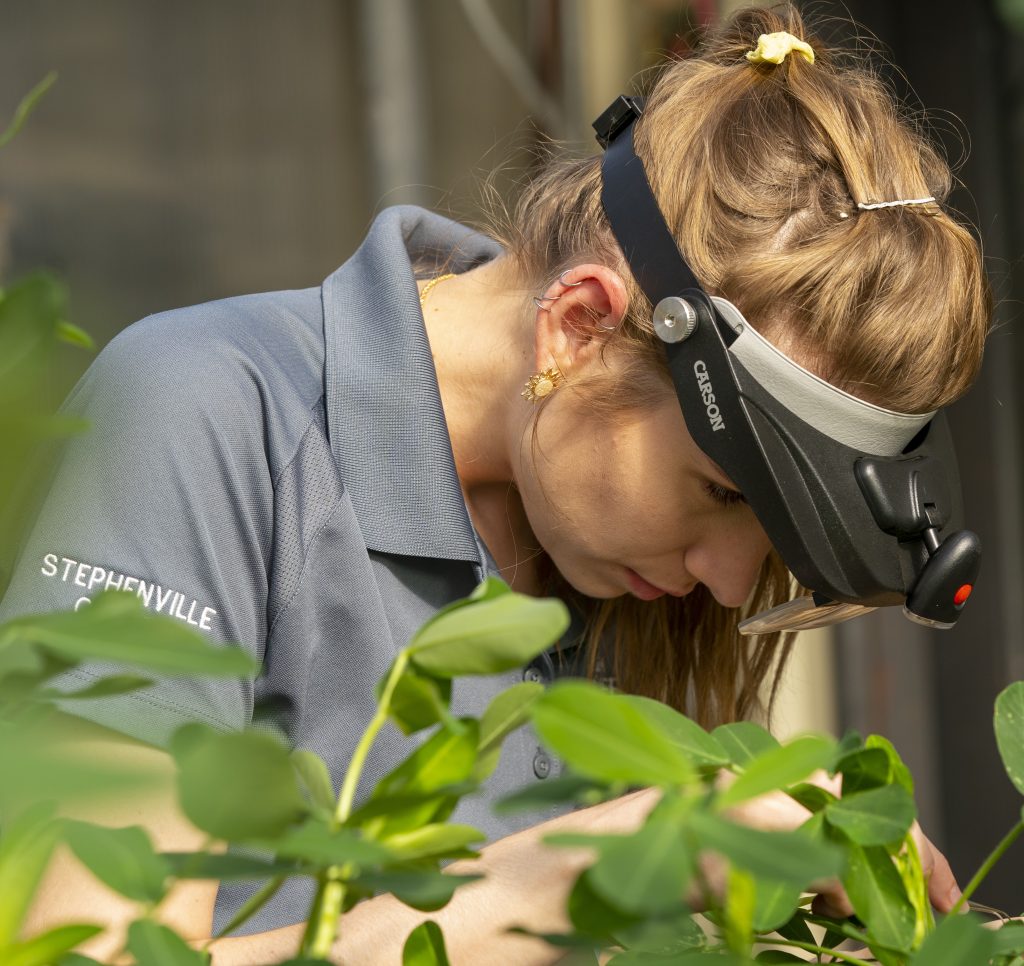
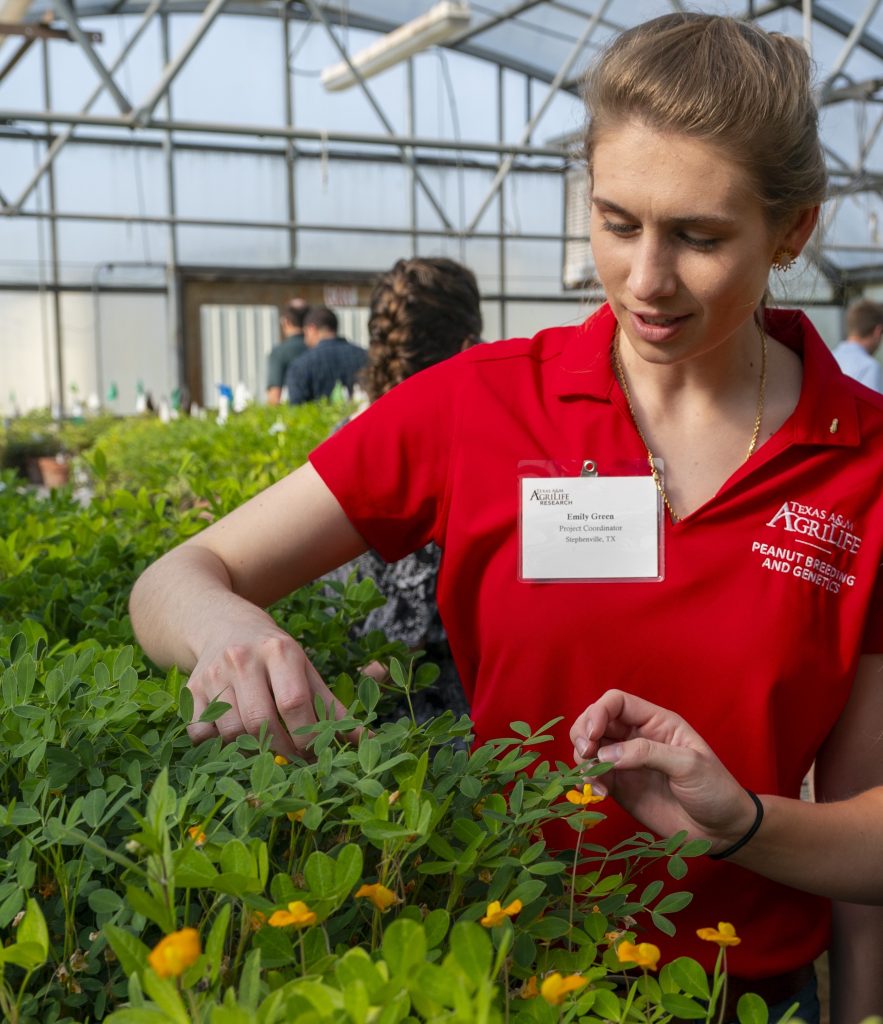
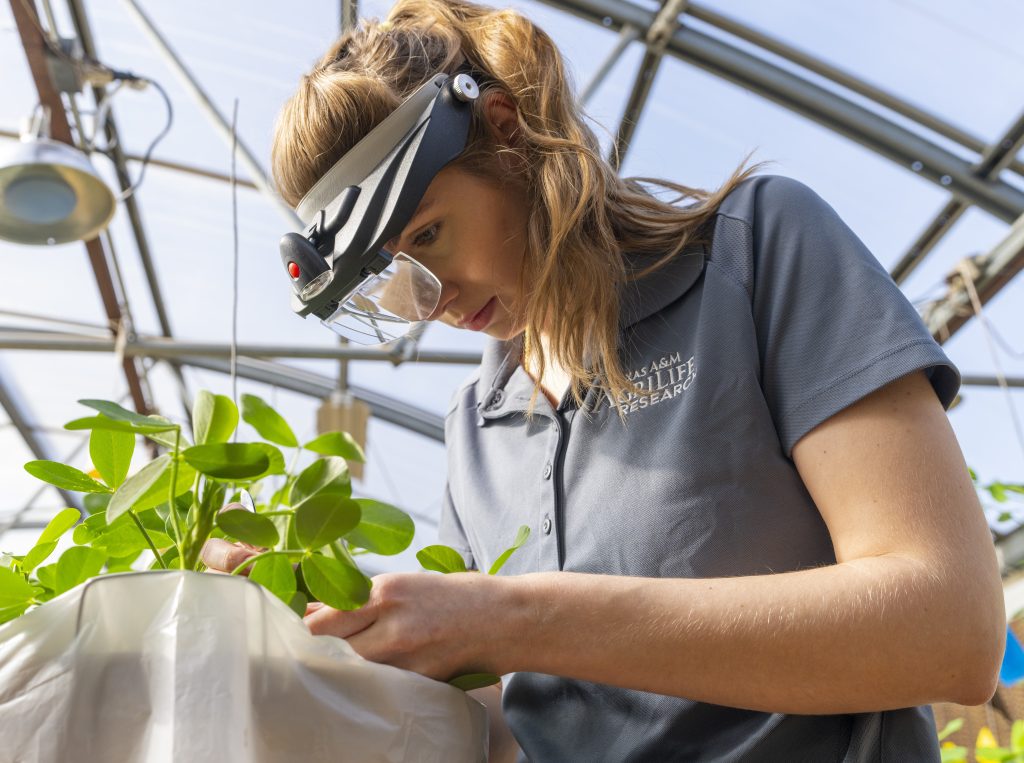
Return of the Mexican Manufacturers Tour
The Mexican Peanut Manufacturers were eagerly welcomed back for a tour of shelling facilities and peanut fields, after a two-year break due to the pandemic.
Once held annually, this year’s tour represented the first reverse trade mission hosted by American Peanut Council since 2019. It was co-hosted by the Texas Peanut Producers Board in Lubbock, Texas from October 10-13.
Shelly Nutt, TPPB Executive Director said, “the aspiration for this event is to strengthen relationships between exporters and their foreign customers and build additional demand for U.S. peanuts and peanut products.” The delegation of key Mexican customers in Texas was to learn firsthand about the U.S. peanut industry.

Since APC last hosted a delegation from Mexico, the country has grown to become the top market for U.S. peanut exports, with shipments totaling 139.000 MT valued at $189 million in 2021.
In attendance were 27 representatives from Mexico, including representatives from various-sized importers, distributors, and snack manufacturers. Also were buyers from major export companies such as Galdisa, Bokados, Martin Cubero, and Naturasol. Almost 20 companies were in attendance representing over 80% of the market of total peanut exports to
Mexico. Sheller representatives from Birdsong Peanut, Golden Peanut, Wilco Peanut, Algrano Peanut, Trico Peanut, and Premium Peanut and peanut brokers were on hand, ready to answer questions and make sales.
During the three-day event, attendees visited peanut fields, toured shelling plants, and learned more about key aspects of peanut production. They also enjoyed presentations from the National Oceanic and Atmospheric Administration, The Peanut Institute, Kantar World Panel, and JLA International.
On Monday, October 10th, the event kicked off with a welcome reception and dinner. Attendees were entertained by local artist Bo Garza and enjoyed outdoor games such as corn hole and Jenga. On Tuesday, the group toured Birdsong Peanut in Brownfield and Trico Peanut in Seminole and saw some peanut fields along the way. Dinner was held at Las Brisas Southwest Steakhouse and was sponsored by the American Peanut Shellers Association, Wilco, and Algrano. Wednesday was spent in the classroom with a nutritional update given by Greg Harnish on behalf of The Peanut Institute, and a US crop update given by Foy Mills of JLA.
Everyone involved in the 2022 Mexican Manufacturers Tour was thrilled to once again be able to put on this productive tour. The tour had great participants who had the utmost desire and passion to Texas and US peanuts. TPPB would like to thank all attendees on the 2022 tour and American Peanut Council for helping make connections with the international markets.
Texas Tech Graduate Student Takes Award at National Poster Competition
Megan Mills placed first in the National Peanut Board Graduate Student Poster Competition at the 2022 American Peanut Research and Education Society Conference. Megan’s research was over Peanut Response to Diclosulam in the Southwest.
Megan is a masters student at Texas Tech University in the plant and soil science program and is currently working in the weed science department for the Texas A&M Agrilife Extension Service under Dr. Peter A. Dotray. Before Megan came to Tech for her masters degree, she graduated from Texas A&M with her Bachelor of Science in Animal Science.

Megan said the APRES Conference was a wonderful opportunity to learn more about the industry, everything from pathology presentations to physiology and much more. Which was a great experience for everyone who attended to understand the most pressing issues in the peanut industry and how to combat them.
Megan was encouraged to enter the contest by a fellow colleague. Once deciding to enter the competition, Megan approached Dr. Dotray about peanut research that hadn’t been presented yet.
The research was conducted by Peter Dotray, PhD., Todd Baughman, PhD.,and William Grichar, PhD and was a crop response study in the Southwest to a herbicide with the active ingredient being Diclosulam, also known as Strongarm.
Diclosulam, or “Strongarm,” is currently being used in the Southeast, however it is prohibited in Texas, New Mexico, and Oklahoma, due to the herbicide contributing to stunting and chlorosis of the plants.
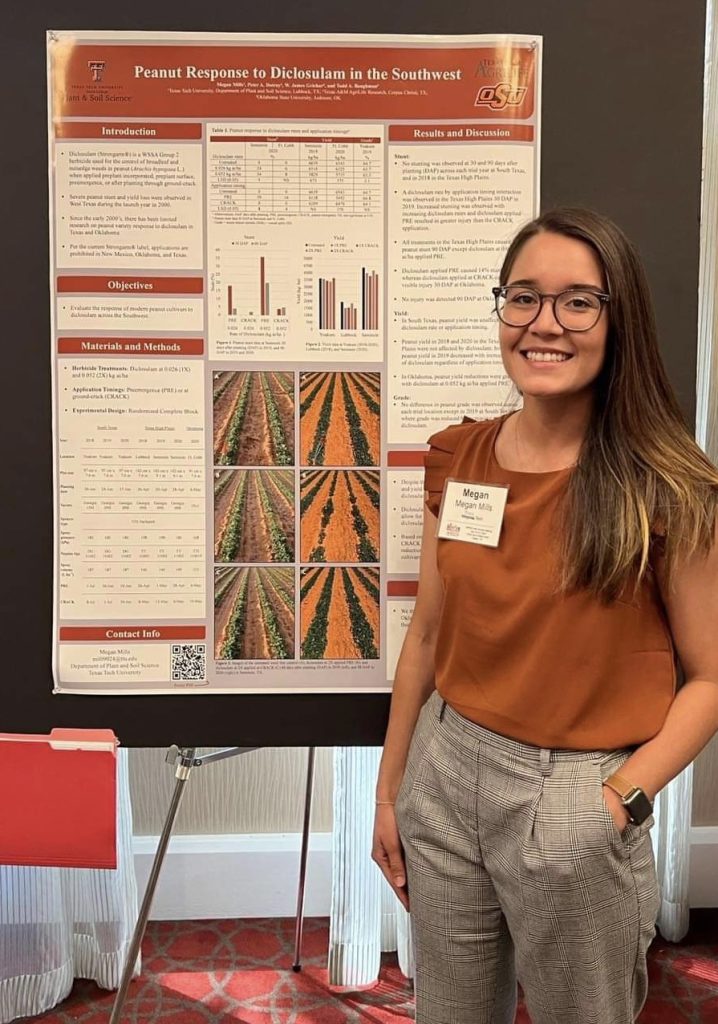
These studies primarily researched if the cause of the stunting was due to older varieties, and maybe with the latest development in varieties, Diclosulam will have a better response.
Megan said that the conclusion of her research is that Diclosulam is still causing stunting in plants in the Southwest region. However, the responses vary depending on when you apply the herbicide to the plant.
Megan’s research with Diclosulam will be of great help to researchers and farmers in the years to come. Growers can’t use this herbicide right now, but hopefully this research that was conducted will allow for edits to the label so that growers may possibly use this herbicide to broaden their chemical control in peanuts.
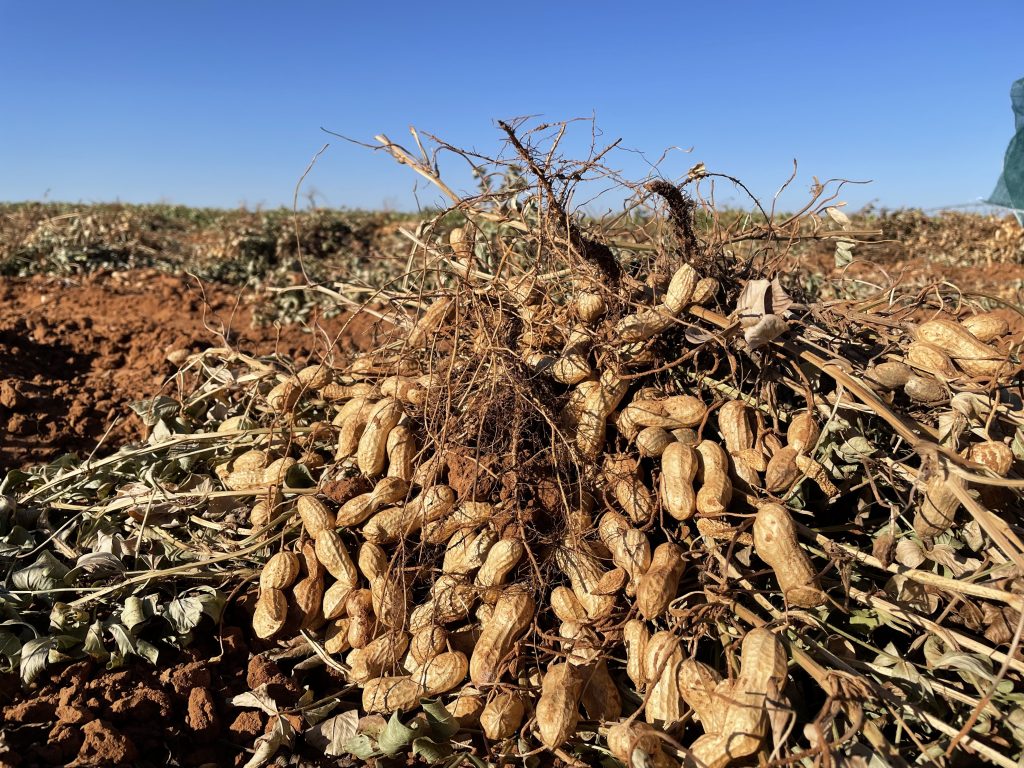
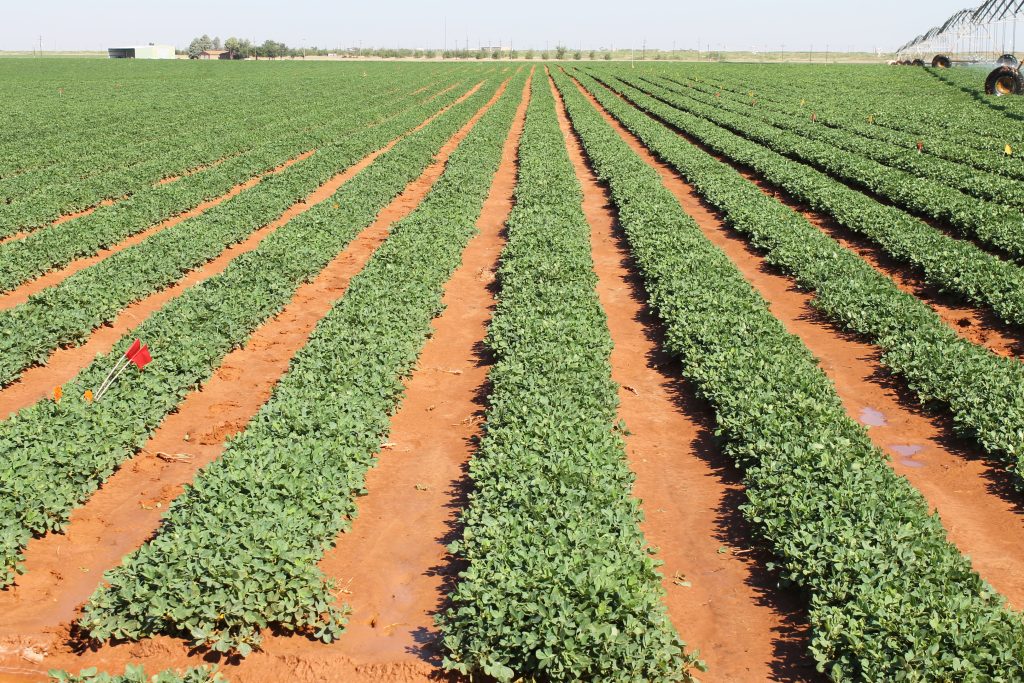
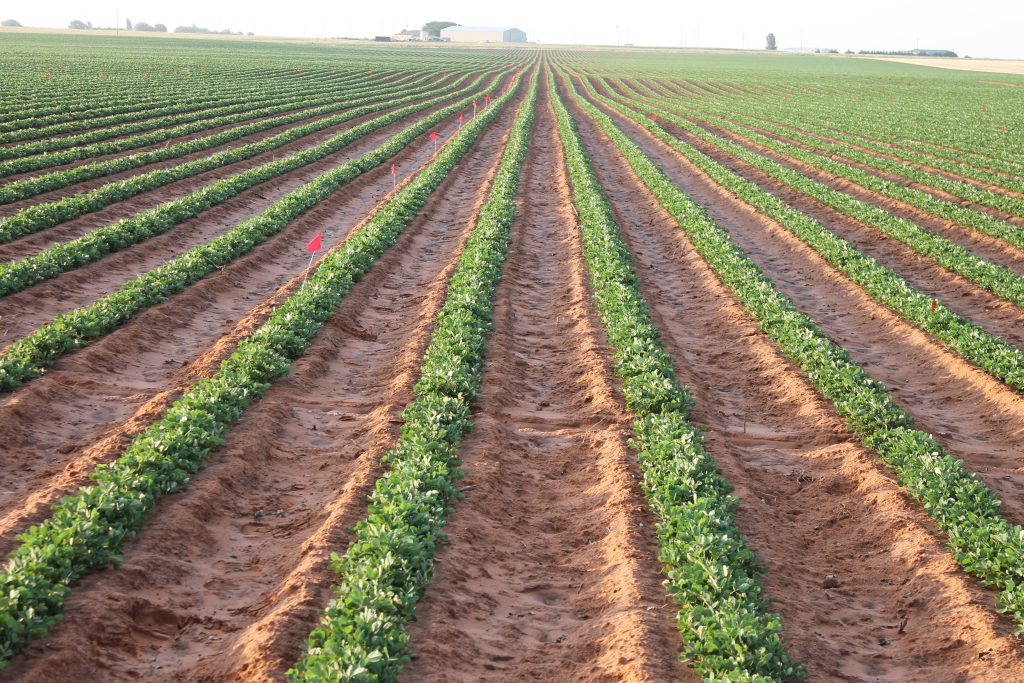
Mike Berry Awarded 2022 County Agent Award
We awarded Mike Berry with the 2022 County Agent Award for his excellent contributions to the #TexasPeanuts industry. Berry has been with Texas A&M AgriLife Extension Service since 2005, so he is an expert in #texasag. He has been the county agent in Comanche County since 2012. He coordinates with multiple agriculture producer groups and extension specialists to plan and implement comprehensive educational efforts. A few areas of interest include peanut research trials, grower demonstrations, tours, and educational programs.
Comanche County is one of the more diverse agriculture counties in the state. Peanuts have a strong history in the county and still provide an excellent cropping option and rotation for producers. Berry considers it an honor and privilege to be able to work with local agriculture producers.
Thank you Mr. Berry for all the work you have put into our industry!
Communications Intern
The Texas Peanut Producers Board is seeking a remote communications intern to help lead all communications and marketing initiatives. Ideal applicant can create a strong personal drive with little oversight. This internship is the ideal opportunity to take what you are learning in class and put it into action. Interns have creative freedom on a variety of projects, a great opportunity to add marketable pieces to your portfolio. The selected candidate will report to the executive director.
Qualifications
- Currently pursuing a degree in a field related to the responsibilities of this role.
- Punctuality and the ability to manage multiple deadline projects.
- Ability to accept critiques and make necessary adjustments for project success.
- Professional written and verbal communication skills.
Responsibilities
- Direct point of contact for all editorial and content creation for departmental communications to be circulated internally and externally.
- Prepare, edit and design newsletters and brochures; coordinate and/or build graphics for promotional materials, capture and distribute photographs when onsite.
- Create social media content focusing on industry outreach, audience targeting and engagement within appropriate platforms. Manage and edit WordPress website.
- Proactively stay up to date on industry news content, media, and partnership trends. Identify interesting storylines and opportunities to interview and report on third parties that add value to our partners.
- Participate and provide event and special project coordination including board meetings and farm tours.
Please send a letter of interest and any other documents a candidate sees relevant to campbell@texaspeanutboard.com. Deadline to apply is July 15.
Digging Deep – Developing Prolific Peanut Practices
Peanut pathologist, Dr. Cecilia Monclova-Santana, develops high-quality extension and research programs in Texas based on the growers’ goal to produce a healthy and marketable crop. Her approach is to provide practical information for growers by conducting research to identify causes and management of plant diseases, and then communicating the findings through accessible educational programs.
Monclova-Santana earned her bachelor’s degree in agronomy, and master’s degree in plant pathology, from the University of Puerto Rico-Mayagüez. Her doctorate in plant pathology was awarded by North Dakota State University. Now part of the Texas A&M AgriLife Research & Extension Center in Lubbock, she serves as an assistant professor for both Texas A&M and Texas Tech University. Recently, one of her students presented research findings at an international conference in Puerto Rico. Riley Babcock, graduate student of Texas Tech presented her project, “In-vitro seed treatment fungicide effectiveness against Aspergillus niger and A. flavus.”
Pathology is the science of understanding the root cause and effect of disease, and Monclova-Santana specializes in maladies affecting Arachis hypogaea, the scientific name for the peanut producing plant. She stressed the fact that Texas is so vast, there are variations in growing climates resulting in regionalized diseases. As the peanut pathologist in the Lone Star state, Dr. Monclova-Santana recognizes the importance of extension and training to achieve grower buy-in and adoption of the best practices she prescribes. “I am humbled to learn from farmers’ realities,” said Monclova-Santana. “Extension is here to serve them.”
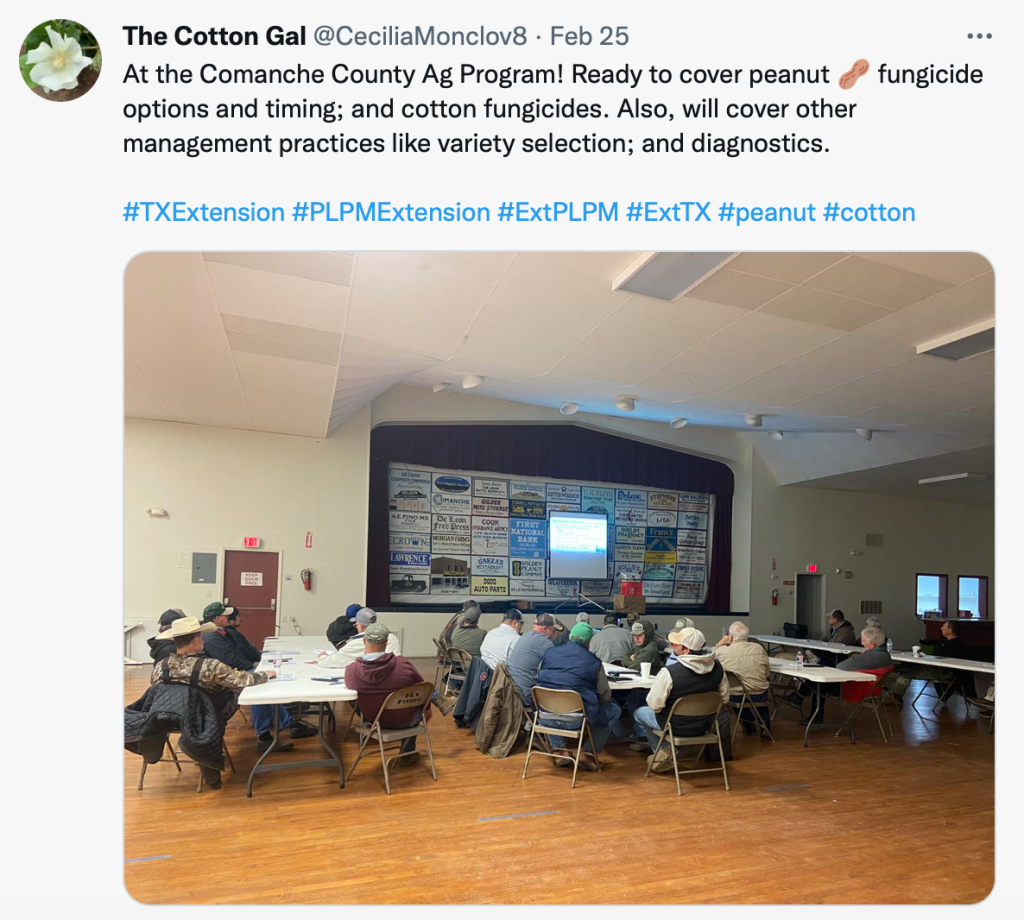
She explained that two years of research are required to adequately address the growers’ primary concerns. Common topics include: water management, soil conservation, white mold, pod rot, and leaf spot. If you are a grower and need to voice a concern, she said reaching out to your AgriLife Extension County Office is the best place to start.
#TexasPeanuts in the Marketplace
“West Texas accounts for a significant percentage of the state’s production,” notes Dr. Monclova-Santana. Other peanut production states can apply as many as 10-12 pesticide applications in a season, while Texas growers apply twice, at most, in a farmer- supported effort to improve accountability, sustainability, and the board’s pledge to reduce the carbon footprint. The characteristically dry conditions found in West Texas act to naturally control disease. Farmers can make the decision not to spray because they know the environment is deterring disease naturally.
A scholar and accomplished pathologist, the influence of social media on society in general is not lost on Monclova-Santana, and she has established a presence on twitter under the name The Cotton Gal, and handle @CeciliaMonclov8. She believes that social media is important for broad visibility and gives small communities and special interests a platform to express their perspectives.
The Texas Peanut Producers Board has been providing research funding and she expressed her gratitude. She is eager to see funding and support from more industry stakeholders, entities that trade on the quality and value of agricultural products. Dr. Monclova-Santana related an important point that without collaboration between scientists and industry partners, efforts may be duplicated and success can take twice as long. She said, “The future of research is collaborative, having industry companies, commodity groups and farmers at the table of discussion.”
Texas Tech Student Presents Research on #TexasPeanuts
Riley Babcock, a first generation university student, received a Bachelor of Science in Botany and Plant Biology from Tarleton State University. During her time in Stephenville, she worked on a virus isolation study with Dustin Edwards, PhD. He shared his wealth of knowledge regarding cotton and peanut production, which increased her professional interest in the agriculture industry.
Choosing Texas Tech University for graduate school was an easy decision, as the West Texas region is home to 57% of the state’s peanut production. Babcock said there is a lot to learn, but the hospitality of the ag industry and everyone’s willingness to teach has made research an optimal learning experience for her.
Her most recent project was a research collaboration with Dr. Cecilia Monclova-Santana, peanut pathologist of Texas. Together they focused on evaluating seed treatment fungicides to control both Aspergillus niger and Aspergillus flavus, “In-vitro seed treatment fungicide effectiveness against Aspergillus niger and A. flavus.” This research will be applied by growers in selecting seed treatments to promote robust yields and food safety in peanut production.
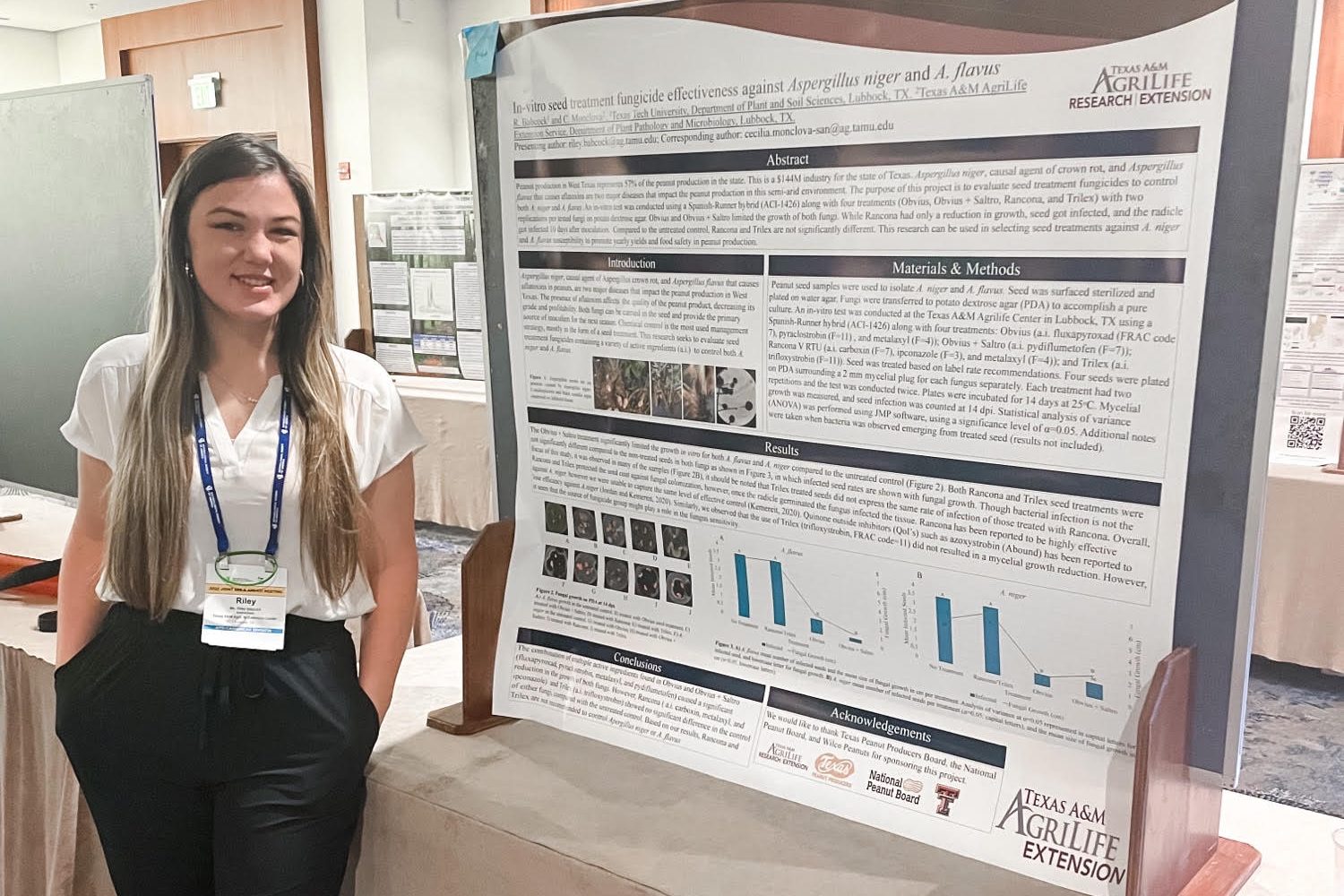
While learning her way around the marketing of fungicides, she took note of the laws regarding timing requirements for approved treatments. Babcock was surprised to uncover a new interest in agricultural law and the economic impact to the growers’ bottom line. Babcock will soon be applying to law school and hopes to be a legal advocate for agriculture. Drawing on her education and business perspectives, she believes she can help bridge the knowledge gaps between producers and lawmakers.
Check out Babcock’s research poster below:

